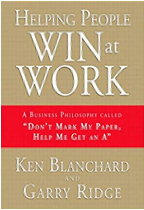|

“The leader has to keep up his or her end
of the partnership relationship on a day-to-day basis,
helping and coaching the tribe member to get an A.”
~Garry Ridge
8th July 2021
 I want to thank all of you who reached out to me with prayers and condolences after my brother’s death. The family is coming to terms with our loss and life is beginning to return to “normal”. When looking back on my brother’s life, not all of it was pretty – he had lots of battles. His sons unfortunately paid a heavy price because he struggled with expressing his emotions to them. But we have also found hundreds of happy moments together and continue to share our favorite memories of him. All our remembrances are of the little things; something he said, or did and when we shared laughs. One of my favorite memories is when my brother and I spoke in that famous “Fargo” Northern Minnesota accent for a full day after watching the movie with my mom. We had her in tears she was laughing so hard. It makes me smile when I think of it. I want to thank all of you who reached out to me with prayers and condolences after my brother’s death. The family is coming to terms with our loss and life is beginning to return to “normal”. When looking back on my brother’s life, not all of it was pretty – he had lots of battles. His sons unfortunately paid a heavy price because he struggled with expressing his emotions to them. But we have also found hundreds of happy moments together and continue to share our favorite memories of him. All our remembrances are of the little things; something he said, or did and when we shared laughs. One of my favorite memories is when my brother and I spoke in that famous “Fargo” Northern Minnesota accent for a full day after watching the movie with my mom. We had her in tears she was laughing so hard. It makes me smile when I think of it.
My brother’s death is a good reminder to say, “I love you” often and to enjoy the little things in life. That also includes the day-to-day engagements with people at work. We typically spend more than one-third of our life in the company of others outside of our immediate family. Consequently, these engagements can have a major impact on our lives; i.e., help us feel fulfilled and valued.
Globally, employers are struggling to retain and hire employees. There are more job openings than workers who are willing to go back to work. Some employees are making new demands about continuing to work from home or earning more money. It’s a seller’s market after all. But it’s not always about the money. Often, it’s more about engagement. Employees want to be seen and heard, and to be recognized for their contributions to their employer. They do not want to be treated or thought of as robots. When engagement is missing, they will go elsewhere.
Keep reading to find out more about engagement and how as a leader you can help.
Taking the LEAP with you!

 Employee engagement is golden. Employee engagement is golden.
That’s the key finding of a study from just a few years ago entitled "Employee Engagement and Organizational Commitment".
According to the study, employee engagement (the willingness of an employee to go the extra mile to help their company succeed) has a positive relationship with customer satisfaction, productivity, employee retention, organizational success, and profit.
Similar studies found that in 18 countries, companies with the highest level of employee engagement achieved better financial results and were more successful in retaining their most valued employees than companies with lower levels of engagement.
Those companies with the highest percentage of engaged workers increased operating income by 19% and earnings per share by 28% year-to-year, while those with the lowest showed declines of 33% in operating income and 11% in earnings per share. Those are significant percentages!
Other research shows less than 5% of engaged workers were actively looking for another job, while more than a quarter of disengaged employees were actively looking. And I could bet that the remainder would jump, if an offer to leave happened to come to their attention. Once employees start to leave, it can cause a vicious cycle as well, as further damage is caused to the morale of those left behind.
😄 The good news is that employee engagement reaps great rewards as indicated above by those impressive percentages.
😟 The bad news is less than a quarter of workers are actually engaged with their work and more than a third of workers are partly to fully disengaged. The damage to an employer’s profitability is inevitable.
Closing the Gap
These numbers reflect an engagement gap between what companies need in order to meet their goals, what workers give and companies’ effectiveness in channeling employee effort.
There is more good news, however. Senior leadership has a significant impact on employee engagement. Employees reported their top motivation for increased engagement was the belief that senior management had their best interests at heart. Unfortunately, when questioned, only 10 percent of workers believed their senior manager did have their best interests at heart. More than half of the respondents felt their managers treated them as if they didn’t matter at all.
How many managers cause their staff to frequently miss dinner at home with their spouse and kids, or cancel or cut short planned family vacations or cause the person to come into work when they’re ill? Or blame and shame is the name of the game when mistakes are made rather than using the opportunity to learn something new? Or they micro manage to the point all trust and respect is completely eliminated?
Leadership is hard, especially as quite often the person being promoted to a leadership position is not used to handling the “people” issues of the job. And if you can’t handle “people” issues, you won’t be a good leader who can effectively engage their team members. So, companies can actually damage engagement by not supporting new leaders.
Thankfully, more companies are recognizing the importance of supporting the development of new (and more experienced) leaders by providing them with coaches. I highly recommend this too. Not only can it provide greater understanding of the “people” issues, it allows the person to have an independent sounding board without the fear of judgment.
Ken Blanchard states, “When you lead at a higher level, the development of the people you’re leading is just as important as the performance and results you desire.”
Here are some suggested ways to get higher levels of employee engagement.
1. Increasing the level of empathy leaders have for each of their team members. Truly understand the contribution they can make, what is happening in their lives and how the work demands impact them. Can some flexibility be offered?
The survey concluded companies need to understand their workers as well as they do their customers, and then design a work environment that reflects that understanding. Employers also need to recognize the employees’ untapped energy and ambition, and then channel it in ways that yield real results.
2. Being curious about everything going on – but still allowing team members space to show you trust them to get the job done. In other words, be engaged yourself without micromanaging – be proactive and participate, don’t just observe.
3. Being open to new ideas and constructive criticism and communicating the benefits of engagement. This includes ensuring everyone shares their opinions and ideas; introverts are asked to participate and women are not spoken over or dismissed. It’s critical no judgment or shame is involved. The purpose is to encourage people to use their creativity and get out of “group think”.
The survey revealed employees are eager to invest more of themselves to help the company succeed, but they want to understand how their efforts will benefit them.
While the above behaviors are quite rare among management around the world, adopting them could make a key difference to a company’s bottom line and make everyone happier. Check out the Resource section below to see how you can learn more.
Challenge...
 Here’s a tip on how you can increase your empathy as a leader. Here’s a tip on how you can increase your empathy as a leader.
Ask each employee who reports to you to share a childhood photo of themselves. Notice all the beautiful features of each child in the photos and discover all the natural traits shown in their eyes, e.g., curiosity, joy, caring, love of life, etc. Then discuss how these traits can be brought into the work environment.
RESOURCES and more...
 “Helping People Win at Work, Don’t Mark My Paper, Help Me Get an A”, by Ken Blanchard and Garry Ridge. “Helping People Win at Work, Don’t Mark My Paper, Help Me Get an A”, by Ken Blanchard and Garry Ridge.
The information in this book just makes so much sense. Companies hire people because they know they can contribute to the success of the firm. But yet, most often they start labeling them as “losers” when it comes to the annual performance review when managers are forced to fit their team members into a normal distribution curve. This book helps managers understand the damage caused and the process to put into place to help each team member get an “A” grade. In other words, there is no need for losers!

FREE GIFT
If you know it's time for a change in a specific area of your life, but you aren't sure how to make it happen, this is for you - Courage, Risks and Reward: Taking a Chance to Change Your Life - a 5-part Coaching Program compliments of The LEAP Network! Click here to download the program.
Let's connect...
Join me in a one-hour complimentary strategy session to help determine how you can move forward in getting unstuck, and gain momentum to move in the right direction for you. During our session, we will go over one or two exercises and determine the one next step you can take on your own after the call to keep the momentum going. Click here to schedule your session
SOCIAL MEDIA
   
 Renée Blasky is the Founder and CEO of The LEAP Network Ltd. Renée Blasky is the Founder and CEO of The LEAP Network Ltd.
Renée discovered her business and mindset coaching super powers when she was approached by a woman looking for assistance in developing a business opportunity. She hasn’t looked back since. Coaching women fits with her passion to empower women so they live a fulfilled life and make choices from a foundation of personal power, financial freedom and a deep sense of accomplishment.
Through her own experiences, as well as coaching women entrepreneurs and women in finance, Renée understands women often undermine their confidence and self-esteem. Consequently, they jeopardize their success paths, and mental fitness. As mindset accounts for an estimated 80% of success and happiness, Renée helps her clients to understand the lies they are telling themselves, how they are sabotaging their performance, wellness and relationships and helps them to establish a new journey to thrive utilizing their superpowers.
Renée helps her clients find clarity, regain their passion, set stick-worthy goals, stay focused, create the right mindset, and be accountable. She also gently pushes her clients outside of their comfort zones and helps them face their fears so they can achieve their dreams. Renée works with her clients through various online courses, webinars, one-on-one coaching, and group coaching programs.
Renée, who trained as a life coach with Tony Robbins and Cloé Madanes, is also a certified trainer for Marci Shimoff's Happy for No Reason and Susan Jeffer's Feel the Fear and Do It Anyway courses based on their respective books of the same name. She is also in the process of getting certified in the Positive Intelligence® program to increase her client’s mental fitness.
Renée is aptly qualified to coach women entrepreneurs and women in investments having founded two of her own businesses; investment management consulting services and business coaching. She is passionate about equality, diversity and inclusion and loves multi-cultural environments, having lived abroad for 35 years with assignments in 13 countries. She obtained her Chartered Financial Analyst (CFA) Charter in 1990, and has over 30 years of experience in the investment/finance industry. She is listed in Marquis Who’s Who in the World and Who’s Who in Finance. She has also received various awards and recognition in the investment industry through her work with the CFA Institute and the development of capital markets in East Africa.
Learn more about Renée and The LEAP Network by visiting her website here: www.theleapnetwork.coachesconsole.com.
You can also send an email directly to Renée at rkblasky@theleapnetwork.co (not “.com”)
|